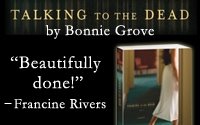 Heather Kendall is the author of a Tale of Two Kingdoms, which traces the history of salvation throughout the Bible. She has been a Sunday School teacher of twos and threes and a ladies' Bible study leader for over thirty years. The last couple of years she has published articles in The Canadian Gideon, The Fellowship LINK, and Faith Today. She also has an excerpt in Daily Devotions for Writers. Recently she joined the editorial committee of The Fellowship LINK and discovered what it is like to edit somebody else’s work. Heather lives in Innisfil, Ontario, with her husband of thirty-nine years. They have three grown children.
Heather Kendall is the author of a Tale of Two Kingdoms, which traces the history of salvation throughout the Bible. She has been a Sunday School teacher of twos and threes and a ladies' Bible study leader for over thirty years. The last couple of years she has published articles in The Canadian Gideon, The Fellowship LINK, and Faith Today. She also has an excerpt in Daily Devotions for Writers. Recently she joined the editorial committee of The Fellowship LINK and discovered what it is like to edit somebody else’s work. Heather lives in Innisfil, Ontario, with her husband of thirty-nine years. They have three grown children.How did you know you were going to be a writer?
I didn’t. I have always been an avid reader and an enthusiastic student. I learned how to read in kindergarten and often visited the children’s section of the public library. As a teenager, youth leaders taught me how to study the Bible. When I was a young married woman, I began to study the Scriptures on my own and to write copious notes. Years later I progressed to writing essays for my pastor. Boarding a bus in 1996 to take my first business trip convinced me I was a writer. I travelled from North Bay to Toronto to do research in theological libraries.
What were the top three obstacles you encountered on the road to being published?
I had no idea how to write a proposal for a publishing company, or even that I had to. I was shy about asking pastors to read my manuscript. One publisher required ten endorsements before considering an unsolicited work. I received three. My biggest obstacle was anonymity. Royalty publishers do not want to invest thousands of dollars without being reasonably sure of making money. Even one self-publisher hesitated because I did not have a platform.
What helped you to stay tenacious even when faced with rejection?

For the twelve years I spent writing my book, my family encouraged me not to give up. I also felt I needed more time to grow up spiritually and to improve my writing. Whenever a publisher rejected me, I rewrote the book. In fact, I was learning something new and changing my manuscript until I gave the final approval before going to print.
You decided to self-publish. From my understanding self-publishing is not for the faint of heart. Tell us how your tenacity came into play through that process.
During one of my visits to the theological libraries in Toronto, I accidentally discovered information about the silent years between the Old and New Testaments. I thought this would be interesting to potential readers. Otherwise I may merely have shared my manuscript with my pastor. After being rejected a couple of times by royalty publishers, I posted my proposal on the Evangelical Christian Publishers Association website (ECPA). Three weeks later an editor offered to critique my manuscript for a price. I gladly accepted his suggestions, but I was sad no one else paid attention to me. This editor was associated with a self-publishing company in the United States. After six months on the ECPA website, I realized I would be self-publishing.
What is the biggest lesson you’ve learned since your book came out?
Not to give up. Marketing a book takes time and requires learning new skills. The Word Guild, a group of authors and editors who are Canadian and Christian, taught me to write articles and to blog for name recognition. In my blog I have been writing devotionals based on observations from nature.
Where will your tenacity take you now?
I am presently working on my second book, God’s Unfolding Story of Salvation: A Bible Study Guide. I have written thirty-seven lessons to trace God’s plan of salvation through the Bible. Afterwards I want to write a short book with ideas taken from my first two books.
What advice do you have for someone who is where you were before you decided to self-publish?
Carefully check out all your options to decide which publisher is best for you. If possible, try to find a royalty publisher who deals with your genre. If you decide to self-publish, first count the emotional and financial cost. As a self-publisher you are responsible for the final product. Therefore seek out editors to improve your work. Then carefully proofread it yourself. Be prepared to invest time and money in marketing your book. Plan how to do this before publishing. I was naïve about this last step.
*****
The world of publishing is filled with choices - it's difficult to know which is the best choice to make for our work. All of us who write, are a small business, and we connect ourselves to other businesses (writers, publishers, printers, agents, etc.) in various ways and with variable results. Always do your homework - get all the facts you need to make the right decision for your project. And remember, a book is not a manuscript - they are very different animals. And a book is always a joint project.
I bid you good writing.









1 comment:
I love the cover of the book, and it sounds very interesting - you're right that we don't know much about the periods between the OT and NT. What's the link to Heather's blog?
Post a Comment